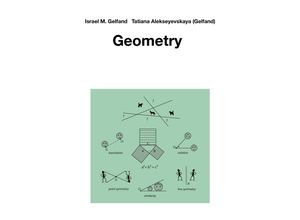This text is the fifth and final in the series of educational books written by Israel Gelfand
with his colleagues for high school students. These books cover the basics of mathematics in a
clear and simple format - the style Gelfand was known for internationally. Gelfand prepared
these materials so as to be suitable for independent studies thus allowing students to learn
and practice the material at their own pace without a class. Geometry takes a different
approach to presenting basic geometry for high-school students and others new to the subject.
Rather than following the traditional axiomatic method that emphasizes formulae and logical
deduction it focuses on geometric constructions. Illustrations and problems are abundant
throughout and readers are encouraged to draw figures and move them in the plane allowing
them to develop and enhance their geometrical vision imagination and creativity. Chapters are
structured so that only certain operations and the instruments to perform these operations are
available for drawing objects and figures on the plane. This structure corresponds to
presenting sequentially projective affine symplectic and Euclidean geometries all the
while ensuring students have the necessary tools to follow along. Geometry is suitable for a
large audience which includes not only high school geometry students but also teachers and
anyone else interested in improving their geometrical vision and intuition skills useful in
many professions. Similarly experienced mathematicians can appreciate the book's unique way of
presenting plane geometry in a simple form while adhering to its depth and rigor. Gelfand was a
great mathematician and also a great teacher. The book provides an atypical view of geometry.
Gelfand gets to the intuitive core of geometry to the phenomena of shapes and how they move in
the plane leading us to a better understanding of what coordinate geometry and axiomatic
geometry seek to describe. - Mark Saul PhD Executive Director Julia Robinson Mathematics
Festival The subject matter is presented as intuitive interesting and fun. No previous
knowledge of the subject is required. Starting from the simplest concepts and by inculcating in
the reader the use of visualization skills [and] after reading the explanations and working
through the examples you will be able to confidently tackle the interesting problems posed. I
highly recommend the book to any person interested in this fascinating branch of mathematics. -
Ricardo Gorrin a student of the Extended Gelfand Correspondence Program in Mathematics (EGCPM)

